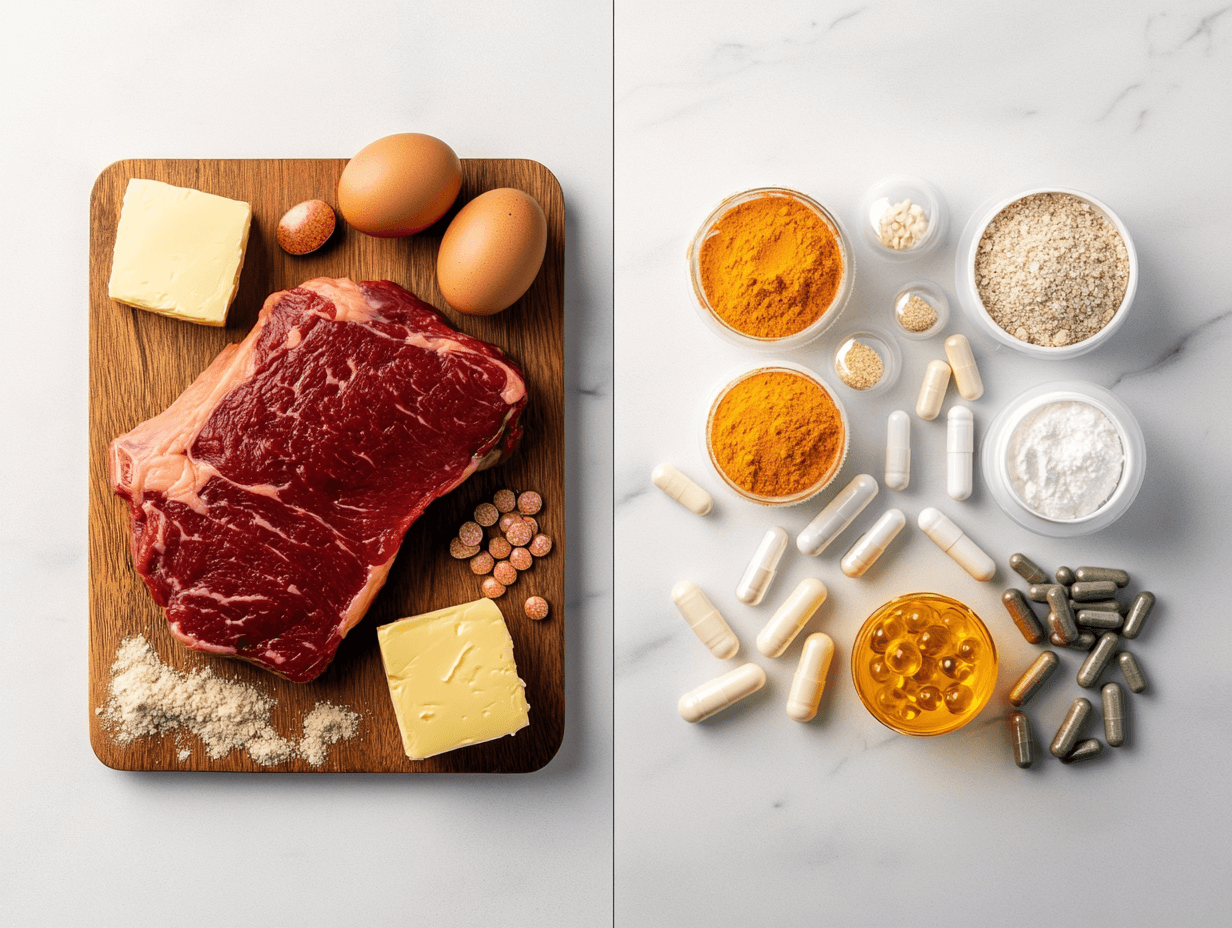
When it comes to optimising health, the food vs supplements debate is more relevant than ever. Many people turn to supplements to fill nutritional gaps, boost energy, and enhance performance. Others argue that a nutrient-dense diet is the best way to get vitamins and minerals in their most natural and bioavailable forms. But which approach is best?
Modern Nutrient Deficiencies: Why We May Need Supplements
Soils today are not what they used to be. Modern farming and nutrients are closely linked — and not always in a positive way. Industrial agriculture, monocropping, and synthetic fertilisers have stripped the earth of essential minerals, affecting the nutrient density of our food. As a result, widespread nutrient deficiencies are becoming increasingly common.
Some of the most commonly depleted nutrients include:
- Boron (Borax/Boron) – Important for bone health, hormone regulation, and magnesium absorption. Found less often in modern soil.
- Iodine – Crucial for thyroid function. Iodine deficiency is growing due to halogen competition (fluoride, chlorine, bromine).
- Magnesium – Involved in over 300 enzymatic reactions. Magnesium deficiency is common in both adults and children.
- Potassium – Essential for heart and nerve function but often lacking due to high-sodium diets and poor soil quality.
- Vitamin K2 vs K1 – K1 comes from leafy greens, while vitamin K2 (critical for calcium metabolism) is found in fermented foods and animal-based nutrition.
Because of these deficiencies, many people are turning to high-quality supplements to bridge the gap.
The Pros and Cons of Supplementation
Pros:
- Fills Nutrient Gaps – Especially minerals missing from food due to soil depletion.
- Convenience & Precision – Allows you to target specific deficiencies with accurate dosing.
- Higher Bioavailability (in some cases) – Forms like magnesium glycinate or liposomal vitamin C may be better absorbed.
- Necessary for Some Groups – Pregnant women, vegans, people with gut health issues, or those under stress may benefit.
Cons:
- Low Supplement Quality – Fillers, heavy metals, and synthetic ingredients are common.
- Lack of Co-factors – Isolated nutrients may not be as effective without synergistic support (e.g. vitamin D helps with calcium uptake).
- Risk of Overdosing – Especially with fat-soluble vitamins like A, D, E, and K.
- Regulation Issues – Many products are poorly tested or mislabelled.
Choosing High-Quality Supplements
If you opt for supplements, look for:
- Whole-food-derived forms
- Third-party testing for purity and heavy metals
- Bioavailable nutrients, like magnesium citrate or K2 MK-7
- Avoid fillers, synthetic colours, and preservatives
The Pros and Cons of a Nutrient-Dense Diet
Pros:
- Complete Nutrient Spectrum – Includes enzymes, fibre, and synergistic compounds
- Better Nutrient Absorption – Particularly when nutrients come from natural food matrices
- Gut Health Benefits – A whole-food diet supports a healthy digestive system
- Synergy – Eating vitamin K2-rich butter with leafy greens (K1) helps maximise nutrient use
Cons:
- Soil Depletion – Our food may contain fewer micronutrients than it once did
- Time & Planning – High-quality foods require more sourcing and preparation
- Cost – Natural health options like organic or regenerative food can be expensive
Plant-Based vs Animal-Based Nutrition: What’s More Bioavailable?
| Nutrient | Plant-Based Source | Animal-Based Source | Which is more Bioavailable? |
| Iron | Lentils, Spinach | Red meat, liver | Animal-based (heme iron is better absorbed) |
| Vitamin A | Carrots, sweet potato | Liver, egg yolks | Animal-based (retinol form is immediately usable) |
| Omega-3s | Flaxseed, walnuts | Salmon, Sardines | Animal-based (EPA & DHA are more effective than ALA) |
| B12 | None | Beef, eggs, fish | Animal-based (not found in plants) |
| Vitamin K2 | Natto (fermented soy) | Grass-fed butter, cheese, egg yolks | Animal-based (MK-4 & MK-7 forms are better utilized) |
Plant-based nutrition can be powerful but often lacks certain bioavailable nutrients that are abundant in animal foods.
The Verdict: Food vs Supplements?
The most effective strategy is a combination of both:
- Prioritise a nutrient-dense diet using whole, organic, and regeneratively farmed foods
- Understand that nutrient gaps are real due to industrial agriculture
- Use high-quality supplements to address unavoidable deficiencies
- Tailor your approach based on bioavailability, diet type, and personal health needs
Food vs supplements doesn’t have to be a battle — they can work hand-in-hand to support your health, energy, and long-term vitality.
Food Vs Supplements: What Do You Think ?
Do you rely on supplements, or do you prefer to get everything from food? Have you noticed a difference in how you feel with certain nutrients? Share your thoughts below!



